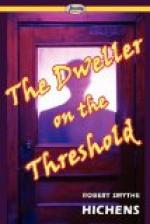“Now I must tell you, and I rely absolutely on your regarding this as said in the strictest, most inviolable confidence—”
“Certainly. Word of honor, and so forth!” said the professor, quickly and sharply.
“I must tell you that Marcus Harding is a sinner, and not merely in the sense in which all men are sinners. There have been recurring moments in his life when he has committed actions which, if publicly known, would ruin him in the eyes of the world and put an end to his career. As I looked at myself standing before my house, I saw that I was hesitating whether to go in with my misery, or whether to seek for it the hideous alleviation of my beloved sin.
“Professor,”—it seemed to Stepton at this moment as if Chichester’s voice loomed upon him out of the darkness by which they were now enshrouded,—“it has been said that nothing shocks a man so terribly as the sight of his body-double; that to see what appears to be himself, even if only standing at a window or sitting before a fire, causes in a man a physical horror which seems to strike to the very roots of his physical being. I looked now upon my soul-double, piercing the fleshly envelop and it was my very soul that sweated and turned cold. For I perceived the dreadful action which, if known, would certainly ruin me, being committed by the spirit. The slavish body had not yet bowed down and done its part; but it was about to obey the impulse of the spirit. Slowly the body turned away from its home. The spirit was driving it. The demon with the whip was at work in the night. I looked till the dawn came. And only when at last my double crept, like a thief, into its house, did sleep take me for a little while—sleep that was alive with nightmare.”
Chichester was silent. The professor heard him breathing quickly, saw him, almost as a shadow just shown by the faint light that entered from the street through the two small windows, clasp and unclasp his hands, touch his forehead, his eyelids, move in his chair, like a man profoundly stirred and unable to be at ease.
“When I woke,” he continued, after a long pause, which the professor did not break by a word or a movement, “I woke to combat. As I told you, I had resolved at once to resign my curacy, and never to see that man again. In the light of the morning I sat down to write my letter of resignation; but I could not do it. A fearful compulsion to remain was upon me. I wrote a few words. I stopped, tore the note up, began again. But writing was impossible. Then I resolved to visit Marcus Harding and to tell him that I must go. I went to his house. He was at home. When I saw him I told him that I wished him to sit again that night. He strove to refuse. He did not understand the truth, but he was terrified. I ordered him to come to my rooms that night, and left him. As I was going away I met Lady Sophia. To my amazement, she stopped me, spoke to me kindly, even more than kindly, looked at me with an expression




